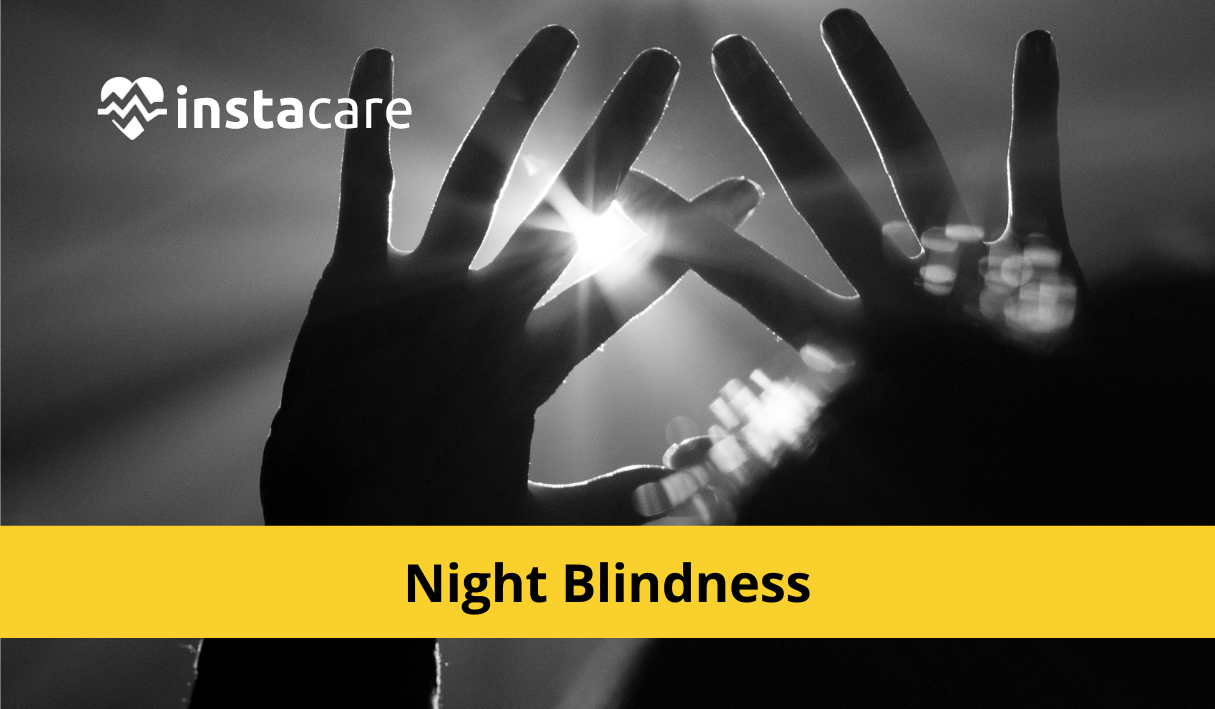Are you having difficulty seeing in the dark, or coming across dimly lit places? You may be experiencing night blindness, also known as nyctalopia. To help understand this eye condition and its treatments better, it is important to first know what causes night blindness and related symptoms. In this article, we’ll discuss the common causes of night blindness and how they can be treated. We'll cover who is more likely to suffer from nyctalopia, what exact symptoms accompany this eye ailment, as well as possible treatment options so that readers can regain a clearer view of their surroundings regardless of time or darkness.
What is night blindness?
Night blindness is an eye condition that mainly affects night vision and adversely affects a person's ability to see in low light environments. It is also known as nyctalopia, and is caused by a deficiency in vitamin a which hinders the eyes' ability to form images from faint light. The extent to which night blindness affects a person can vary widely from only having difficulty seeing when it is very dark, to not being able to navigate outdoors after sunset at all.
People suffering from this condition are more likely to take longer ways home to avoid crossing paths with lurking objects or risk becoming disoriented due to the lack of landmarks. Night blindness can be treated with medication, dietary supplements, and lifestyle changes such as avoiding crashing snacks late at night that may reduce the body's absorption of vitamin a while sleeping.
What happens to the eye in low or no light?
When light levels drop, the eye will respond by expanding its pupil as a reaction to reduce the amount of light entering the eye. This is an important factor in our ability to see in low or no light conditions. Additionally, low light can cause a condition called night blindness which makes it difficult to distinguish between objects or navigate a path while in darkness.
In order to best ensure that vision is maintained even in these conditions, it is essential to practice proper eye care techniques such as wearing sunglasses while outdoors and regularly visiting your optometrist for comprehensive exams.
Common causes of night blindness
Night blindness is a condition characterized by an inability to see in dim light, such as at night. It is most commonly caused by a deficiency in vitamin a, which helps the eye adjust to changes in light conditions. Additionally, genetic abnormalities associated with certain enzymes can also cause night blindness, such as those found with retinitis pigmentosa or leber’s congenital amaurosis.
View More: Top Effective Ways How To Improve Vision In 7 Days
Cataracts, decreased lipid metabolism or diabetes can also contribute to declining vision during lower illumination. Certain medications too are known to cause poor nighttime vision and should be discussed with a physician if abnormal symptoms arise. While night blindness may be mildly inconvenient in daily life, it is important to have the symptoms checked out by an optometrist so that further damage is prevented.
Symptoms of night blindness
Night blindness, or nyctalopia, is a disorder that affects the eyes’ ability to adjust to low levels of light. Its main tell-tale sign is an impaired ability to see in dimly lit and dark places. Other common symptoms include blurred vision in general and difficulty seeing objects at night or in dark hallways.
Some people may suffer from complete night blindness, whilst others may experience a partial loss of sight when illumination decreases. If you or someone you know experiences any of these symptoms, it is important to consult with a doctor as soon as possible so they can rule out any underlying conditions and determine whether the person is suffering from night blindness or another eye disorder.
Blindness treatment
Treating blindness has come a long way since early treatments relied on simpler forms of suggestions and psychotherapy. Today, a variety of strategies are used to help people with physical disabilities gain some degree of sight. These range from providing low vision aids like magnifying devices and telescopic lenses to more advanced artificial implants that replicate the connections between eye and brain.
These various treatments have improved dramatically over the years, allowing for more effective therapies for several stages of visual impairment. It is important to note that with modern treatments, full restoration of vision rarely occurs, but most patients find significant improvements in their condition that can lead to increased independence and enjoyment of life activities.
Treatment of night blindness at home
Night blindness, or nyctalopia, is a serious condition that can be treated with lifestyle changes and home remedies. To reduce the impact of night blindness, it is important to eat a healthy diet full of carotenoids and essential fatty acids, as these nutrients can help support healthy vision. Additionally, increased exposure to natural light during the day can help the eyes adjust more easily to low-light situations at night.
Finally, drinking plenty of water and reduced screen time can also help minimize the effects of night blindness for those affected. While medical attention may still be necessary for some cases, taking small steps at home can have tremendous benefits for people suffering from this eye disorder.
How can i prevent night blindness?
Taking steps to prevent night blindness is essential, as it is a condition that can seriously impair your vision and your overall quality of life. There are a couple of practices you can take to prevent this condition. Begin with eating foods which are rich in vitamin a, such as most dark green leafy vegetables, beans, fish, and eggs. These nutrients help create the pigments in the eyes that receive light and color, supporting night vision health.
It is also important to maintain good general health habits such as reducing intake of salt, sugar and processed foods; exercising regularly; getting adequate rest; avoiding smoking and drinking alcohol; and managing stress levels. Additionally, wearing sunglasses when out in the sun can protect your eyes from the sun's harmful uv rays, reducing your risk of night blindness. Finally, check-ins with your medical professional for regular eye exams may help to detect underlying issues which might be causing or leading to night blindness earlier on for timely treatment options and prevention measures.
Which vitamin is caused night blindness?
Night blindness, or nyctalopia, is a condition in which a person has difficulty seeing in dim light or at night. This condition is most commonly caused by vitamin a deficiency and can be treated with supplements. It occurs when the eye does not get enough vitamin a to produce enough of the pigment responsible for low-light vision - thus making it difficult to see in dark environments.
View More: Weakness Of Vision - Symptoms Causes Treatment And Remedies
The lack of vitamin a can also cause dryness of the eyes and corneal ulcers. Symptoms of this disorder include seeing halos around lights, poor vision at night, and decreased color vision. Night blindness can be reduced through an increase in vitamin a intake or through antibiotic treatment. It is best to talk to your doctor if you think you might be suffering from this condition so that an appropriate course of action can be determined.
Conclusion
Though it can be a nuisance, night blindness is usually not indicative of any serious underlying health issue. For most people, treatment is as simple as adjusting to brighter lighting conditions and wearing eye protection when outside in the dark. If you are experiencing difficulties with your vision, especially at night, consult an optometrist or ophthalmologist for a comprehensive evaluation.
Please book an appointment with the Best ENT Specialist in Lahore, Karachi, Islamabad, and all major cities of Pakistan through InstaCare, or call our helpline at 02137136090 to find the verified doctor for your disease.
Source: https://instacare.pk/blog/night-blindness-causes-and-treatment






